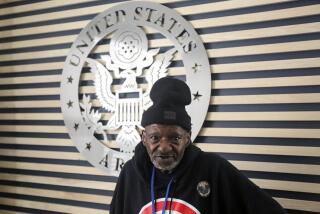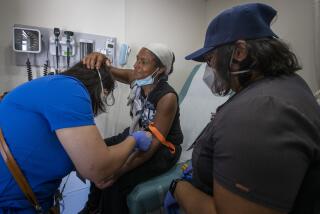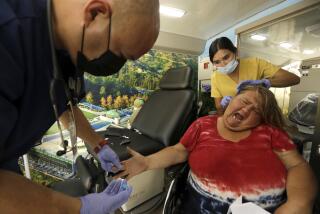Urban MASH Unit Brings Aid to Needy : Denver installation is the first time such a field hospital has been opened to U.S. civilians outside a disaster area.
- Share via
DENVER — The gunshots heard nightly around the cluster of olive drab military tents aren’t the sounds of battlefield skirmishes. They are blasts from drive-by shootings.
But some relief has come to this decaying neighborhood in the shadows of Denver’s skyscrapers, where a MASH unit is busy caring for the homeless and the needy.
The National Guard’s two-week mission represents the first time that a field hospital of this scale has been opened to U.S. civilians outside a disaster area. Officials expect to treat 200 to 300 needy patients a day, offering dental and vision care and basic outpatient services.
Up until now, most of the 147th Combat Support Hospital unit’s training has been simulated. About 20 guard units across the country have conducted real-life training operations, but all have been overseas, mostly in Central and South America.
“We’ve been doing medical missions overseas for years,” said Capt. Joe Rice, the project coordinator. “Last year Congress passed authorization for a pilot program and that’s why we’re here.”
Simulated training has led to deficiencies and inadequate staffing among the National Guard troops and reservists who accounted for more than half the medical experts serving during the Persian Gulf War, according to the General Accounting Office.
“During Desert Storm there was a shortage of personnel available to treat noncombat needs such as dental or gynecological services,” said Mark Gebicke, a military operations expert with the GAO.
Indeed, dental care is the most sought-after service provided by the temporary MASH unit here.
Loretta Weiderspan, 45, limped into the compound on a severely swollen leg. But it wasn’t her that leg that drove her here; it was her aching teeth.
Pointing to a wad of bloody gauze packed on the left side of her mouth, Weiderspan said, “I was trying to take them out myself, like I did the two on the other side.”
As dentist Daniel Savistske, 41, helped her from the dental chair, Weiderspan smiled and said, “That didn’t hurt at all. Thank you and bless you so much.”
“You’re welcome,” Savistske said. Later, he shook his head. “I’ve been pulling a lot of teeth; you’d think it was the Third World.”
Next stop for Weiderspan: the optometrist’s tent. Because of diabetes, Weiderspan’s eyesight has deteriorated so much that her two-year-old prescription glasses are now useless. She made an appointment to return in three days.
Weiderspan, who trades housekeeping and cooking for a place to sleep, also hadn’t been taking her diabetes medication for the past month because she couldn’t afford it. The field pharmacists gave her a supply of donated medicine.
Not all the patients at the clinic, which opened last week, are homeless or truly needy. Chisandra Burden, 42, who is putting herself through graduate school, heard about the service on television and came seeking relief for a painful tooth. “I’m paying taxes, I’m not homeless,” Burden said. “But I’m struggling to make enough to survive and finish school, too.”
Rice estimated the average cost of treatments at the clinic at $42 per patient, contrasted with $92 at a county hospital and $142 at a private hospital or clinic.
National Guard administrators said that the success of this pilot project and its cost effectiveness is likely to spawn similar training missions in at least 35 other states later this year.
The military medical mission comes at the time when President Clinton’s proposal to provide health insurance for every American is under attack and many alternatives are being debated.
First Lady Hillary Rodham Clinton, in Colorado to promote the President’s health care reform plan, swept through the MASH unit Monday shaking hands with patients and National Guard troops. She wished a happy birthday to 4-year-old Gabrielle Thorne of Denver, whose presents included two shots in the thigh and an oral polio vaccine.
Mrs. Clinton praised the Guard and its project. “I’ve seen many Guard units respond to disasters here in this country, but I’ve never seen them provide services like this. . . . It’s a common sense solution to a serious problem.”
She said the dire health care needs of the two dozen or so clinic patients Monday afternoon reflected those of the needy elsewhere in the United States.
“You are groundbreakers,” she told the doctors, nurses and medics on hand. “I hope this will become a model across the country.”
More to Read
Sign up for Essential California
The most important California stories and recommendations in your inbox every morning.
You may occasionally receive promotional content from the Los Angeles Times.













